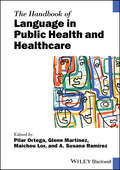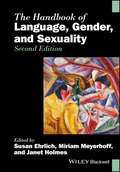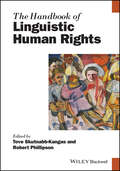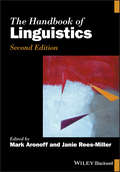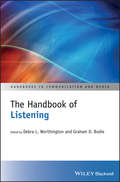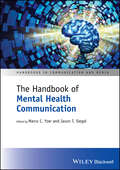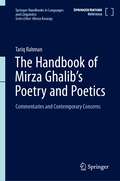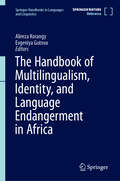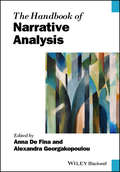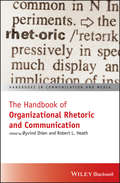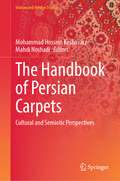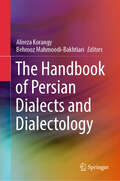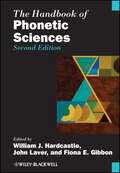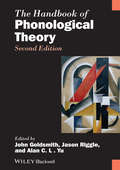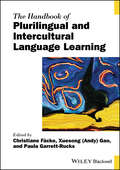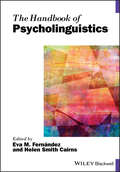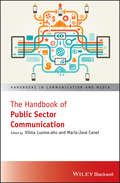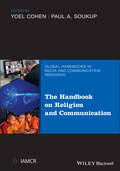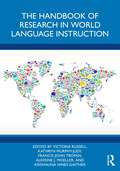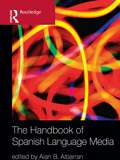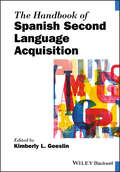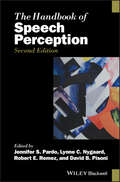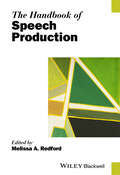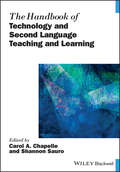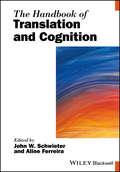- Table View
- List View
The Handbook of Language in Public Health and Healthcare (Blackwell Handbooks in Linguistics)
by Pilar Ortega Glenn Martínez Maichou Lor A. Susana RamírezAn interdisciplinary overview of theory, history, and leading research in the field With a joint linguistic and medical perspective, The Handbook of Language in Public Health and Healthcare explores innovative approaches for improving clinical education, clinician-patient communication, assessment, and mass communication. Contributions by a diverse panel of experts address a wide range of key topics, including language concordance in clinical care, medical interpreting, the role of language as a social determinant of health, reaching linguistically diverse audiences during public health crises, assessing clinician language skills, and more. Organized into five parts, the Handbook covers the theory, history, and context of linguistics, language interpretation and translation, language concordance, medical language education pedagogy, and mass communication of health information with linguistically diverse populations. Throughout the text, detailed chapters present solutions and strategies with the potential to improve the health and healthcare of linguistically diverse populations worldwide. In an increasingly multilingual, global society, language has become a critical area of interest for advancing public health and healthcare. The Handbook of Language in Public Health and Healthcare: Helps professionals integrate language-appropriate communication in healthcare settings Addresses clinician-patient communication, assessment, research, and mass public health communication Offers key theoretical insights that inform the intersection of language, public health, and healthcare Highlights how various approaches in the field of linguistics have enriched public health and healthcare practices The Handbook of Language in Public Health and Healthcare is essential reading for undergraduate, postgraduate, and professional students of applied linguistics, health communication, and medicine. It is also an invaluable reference for language educators, clinicians, medical educators, linguists, health policy experts, and researchers.
The Handbook of Language, Gender, and Sexuality (Blackwell Handbooks in Linguistics)
by Susan Ehrlich Janet Holmes Miriam MeyerhoffSignificantly expanded and updated, the second edition of The Handbook of Language, Gender and Sexuality brings together a team of the leading specialists in the field to create a comprehensive overview of key historical themes and issues, along with methodologies and cutting-edge research topics. Examines the dynamic ways that women and men develop and manage gendered identities through their talk, presenting data and case studies from interactions in a range of social contexts and different communities Substantially updated for the second edition, including a new introduction, 24 newly-commissioned chapters, ten updated chapters, and a comprehensive index Includes new chapters on research in non-English speaking countries – from Asia to South America – and cutting-edge topics such as language, gender, and popular culture; language and sexual identities; and language, gender, and socio-phonetics New sections focus on key themes and issues in the field, such as methodological approaches to language and gender, incorporating new chapters on conversation analysis, critical discourse analysis, corpus linguistics, and variation theory Provides unrivalled geographic coverage and an essential resource for a wide range of disciplines, from linguistics, psychology, sociology, and anthropology to communication and gender studies
The Handbook of Linguistic Human Rights (Blackwell Handbooks in Linguistics)
by Robert Phillipson Tove Skutnabb-KangasA groundbreaking new work that sheds light on case studies of linguistic human rights around the world, raising much-needed awareness of the struggles of many peoples and communities The first book of its kind, the Handbook of Linguistic Human Rights presents a diverse range of theoretically grounded studies of linguistic human rights, exemplifying what linguistic justice is and how it might be achieved. Through explorations of ways in which linguistic human rights are understood in both national and international contexts, this innovative volume demonstrates how linguistic human rights are supported or violated on all continents, with a particular focus on the marginalized languages of minorities and Indigenous peoples, in industrialized countries and the Global South. Organized into five parts, this volume first presents approaches to linguistic human rights in international and national law, political theory, sociology, economics, history, education, and critical theory. Subsequent sections address how international standards are promoted or impeded and cross-cutting issues, including translation and interpreting, endangered languages and the internet, the impact of global English, language testing, disaster situations, historical amnesia, and more. This essential reference work: Explores approaches to linguistic human rights in countries of great demographic diversity and conflict Covers cases of linguistic human rights in the Americas, China, Europe, North Africa, India, Nepal and New Zealand, including international minorities, such as the Kurds and the Roma, and the Deaf worldwide. Illustrates how education worldwide has often blocked off minority languages by not offering mother-tongue medium education Presents and assesses conventions, declarations, and recommendations that recognize the rights of Indigenous peoples and minorities. Includes a selection of short texts that present additional existential evidence of linguistic human rights.Edited by two renowned leaders in the field, the Handbook of Linguistic Human Rights is an ideal resource for undergraduate and graduate students of language and law, sociolinguistics, applied linguistics, language policy, language education, indigenous studies, language rights, human rights, and globalization.
The Handbook of Linguistics (Blackwell Handbooks in Linguistics #22)
by Mark Aronoff Janie Rees-Miller"The first edition of this Handbook is built on surveys by well-known figures from around the world and around the intellectual world, reflecting several different theoretical predilections, balancing coverage of enduring questions and important recent work. Those strengths are now enhanced by adding new chapters and thoroughly revising almost all other chapters, partly to reflect ways in which the field has changed in the intervening twenty years, in some places radically. The result is a magnificent volume that can be used for many purposes." David W. Lightfoot, Georgetown University "The Handbook of Linguistics, Second Edition is a stupendous achievement. Aronoff and Rees-Miller have provided overviews of 29 subfields of linguistics, each written by one of the leading researchers in that subfield and each impressively crafted in both style and content. I know of no finer resource for anyone who would wish to be better informed on recent developments in linguistics." Frederick J. Newmeyer, University of Washington, University of British Columbia and Simon Fraser University "Linguists, their students, colleagues, family, and friends: anyone interested in the latest findings from a wide array of linguistic subfields will welcome this second updated and expanded edition of The Handbook of Linguistics. Leading scholars provide highly accessible yet substantive introductions to their fields: it's an even more valuable resource than its predecessor." Sally McConnell-Ginet, Cornell University "No handbook or text offers a more comprehensive, contemporary overview of the field of linguistics in the twenty-first century. New and thoroughly updated chapters by prominent scholars on each topic and subfield make this a unique, landmark publication."Walt Wolfram, North Carolina State University This second edition of The Handbook of Linguistics provides an updated and timely overview of the field of linguistics. The editor's broad definition of the field ensures that the book may be read by those seeking a comprehensive introduction to the subject, but with little or no prior knowledge of the area. Building on the popular first edition, The Handbook of Linguistics, Second Edition features new and revised content reflecting advances within the discipline. New chapters expand the already broad coverage of the Handbook to address and take account of key changes within the field in the intervening years. It explores: psycholinguistics, linguistic anthropology and ethnolinguistics, sociolinguistic theory, language variation and second language pedagogy. With contributions from a global team of leading linguists, this comprehensive and accessible volume is the ideal resource for those engaged in study and work within the dynamic field of linguistics.
The Handbook of Listening: Methodology And Measures (Handbooks in Communication and Media)
by Debra L. Worthington Graham D. BodieThe Handbook of Listening is a comprehensive overview of the field of listening for advanced undergraduate students, graduate students, scholars, and practitioners. First comprehensive academic reference resource dedicated to listening Provides a broad, authoritative, cross-disciplinary overview of key methodological, conceptual, and theoretical issues in the field Covers methods; disciplinary foundations; teaching listening; contexts and applications; and emerging perspectives Original chapters written by a group of international scholars in the field of learning
The Handbook of Mental Health Communication
by Jason T. Siegel Marco C. YzerThe first book of its kind to offer a transdisciplinary exploration of mass communication approaches to mental health In the Handbook of Mental Health Communication, a panel of leading scholars from multiple disciplines presents a comprehensive overview of theory and research at the intersection of mass communication and mental health. With timely and authoritative coverage of the impact of message-based mental health promotion, this unique volume places mental health communication in the context of socio-cultural causes of mental illness — synthesizing public health, psychopathology, and mass communication scholarship into a single volume. Throughout the Handbook, nearly one hundred contributing authors emphasize that understanding communication effects on mental health outcomes begins with recognizing how people across the spectrum of mental illness process relevant information about their own mental health. Fully integrated chapters collectively translate biased information attention, interpretation, and memory in mental health illness to real-world implications of mental illness symptomatology and across the spectrum of mental health issues and disorders. Providing a clear, evidence-based picture of what mental health promotion should look like, The Handbook of Mental Health Communication is an invaluable resource for advanced undergraduate and graduate students, scholars, researchers, lecturers, and all health communication practitioners.
The Handbook of Mirza Ghalib's Poetry and Poetics: Commentaries and Contemporary Concerns (Springer Handbooks in Languages and Linguistics)
by Tariq RahmanThe Handbook of Mirza Ghalib's Poetry and Poetics: Commentaries and Contemporary Concerns is a seminal contribution to Ghalib studies. It provides a detailed commentary in English on the poetry of Mirza Asadullah Khan Ghalib, known as Ghalib (1797-1869), arguably the greatest poet of Urdu not only of the 19th century, when he lived, but of all time. Each couplet is explained in English and is underpinned by historical references. Each chapter is rigorous, thorough, and jargon-free, making it accessible to all readers. The commentary relates to the historical reality of Ghalib's time as well as the contemporary period. It quotes several couplets from Urdu, Punjabi and English literature as well as other significant texts that have influenced civilisations, such as the Bible, the Quran, Dhammapada, Bhagwat Gita, Plato, and so on. It touches upon cultural history, too. Ghalib's commentaries - rich in cultural, historical, and literary references - make his work relevant to a wide range of contemporary concerns. The book is a social and literary guide to Indo-Islamicate culture, Iranian pre-Islamic cultural influences and local folk Indian Islam. The Urdu text of Ghalib and poetry in the literary languages of South Asia -- Persian, Urdu and Punjabi -- are transliterated according to a list of symbols that maintain accuracy and accessibility. The book introduces the reader not only to Ghalib's couplets but also to the most famous form of Islamicate poetry, the ghazal, found in Arabic, Persian, Turkish and Urdu literary traditions. In turn, it provides an alternative lens to understanding Islam and its interdisciplinary connections within the fields of international relations, politics, and sociology.
The Handbook of Multilingualism, Identity, and Language Endangerment in Africa (Springer Handbooks in Languages and Linguistics)
by Alireza Korangy Evgeniya GutovaThis handbook addresses the interrelatedness of nationalism, identity, language, linguistics, and multilingualism in an African context. It covers multilingualism, language and identity, language endangerment, language shift, language maintenance, language contact, diglossia, language decline, language death, language vitality, and much more in, linguistically, one of the richest regions on earth. The variety of alphabets and oral traditions immersed in folklore, made more linguistically complex through issues of inter-borders, and the long history of foreign intrusions and colonialism, has meant a collision of identities and linguistic peculiarities. This book considers these facets in relation to language endangerment in numerous geographies within the African continent. It confronts these questions under the rubric of multilingualism, linguistic geography, and a panoply of other sub-studies. By investigating a multitude of topics around the themes of multilingualism, identity, and language endangerment in Africa, this volume brings together these dimensions to showcase interdisciplinary research in studies of African languages and linguistics. Relevant to applied linguists, socio-linguists, cultural linguistics, language teachers, anthropologists, and scholars in African cultural studies more broadly, this is a vital, urgent text challenging language, and identity, endangerment.
The Handbook of Narrative Analysis (Blackwell Handbooks in Linguistics)
by Alexandra Georgakopoulou Anna De FinaFeaturing contributions from leading scholars in the field, The Handbook of Narrative Analysis is the first comprehensive collection of sociolinguistic scholarship on narrative analysis to be published. Organized thematically to provide an accessible guide for how to engage with narrative without prescribing a rigid analytic framework Represents established modes of narrative analysis juxtaposed with innovative new methods for conducting narrative research Includes coverage of the latest advances in narrative analysis, from work on social media to small stories research Introduces and exemplifies a practice-based approach to narrative analysis that separates narrative from text so as to broaden the field beyond the printed page
The Handbook of Organizational Rhetoric and Communication (Handbooks in Communication and Media)
by Yvind Ihlen X00D8 Robert L HeathA one-stop source for scholars and advanced students who want to get the latest and best overview and discussion of how organizations use rhetoric While the disciplinary study of rhetoric is alive and well, there has been curiously little specific interest in the rhetoric of organizations. This book seeks to remedy that omission. It presents a research collection created by the insights of leading scholars on rhetoric and organizations while discussing state-of-the-art insights from disciplines that have and will continue to use rhetoric. Beginning with an introduction to the topic, The Handbook of Organizational Rhetoric and Communication offers coverage of the foundations and macro-contexts of rhetoric—as well as its use in organizational communication, public relations, marketing, management and organization theory. It then looks at intellectual and moral foundations without which rhetoric could not have occurred, discussing key concepts in rhetorical theory. The book then goes on to analyze the processes of rhetoric and the challenges and strategies involved. A section is also devoted to discussing rhetorical areas or genres—namely contextual application of rhetoric and the challenges that arise, such as strategic issues for management and corporate social responsibility. The final part seeks to answer questions about the book’s contribution to the understanding of organizational rhetoric. It also examines what perspectives are lacking, and what the future might hold for the study of organizational rhetoric. Examines the advantages and perils of organizations that seek to project their voices in order to shape society to their benefits Contains chapters working in the tradition of rhetorical criticism that ask whether organizations’ rhetorical strategies have fulfilled their organizational and societal value Discusses the importance of obvious, traditional, nuanced, and critically valued strategies such as rhetorical interaction in ways that benefit discourse Explores the potential, risks, paradoxes, and requirements of engagement Reflects the views of a team of scholars from across the globe Features contributions from organization-centered fields such as organizational communication, public relations, marketing, management, and organization theory The Handbook of Organizational Rhetoric and Communication will be an ideal resource for advanced undergraduate students, graduate students, and scholars studying organizational communications, public relations, management, and rhetoric.
The Handbook of Persian Carpets: Cultural and Semiotic Perspectives (Iranian and Persian Studies)
by Mohammad Hossein Keshavarz Mahdi NoshadiThis book analyzes Persian carpets through the holistic and multifaceted perspective of cultural linguistics and semiotics, unveiling the deep connections between art, tradition, and collective memory. Persian carpets have been admired as masterpieces of intricate craftsmanship and profound cultural symbolism throughout history. This book takes this appreciation to an entirely new level by drawing on a new analytical framework and offering a platform for future studies in cultural conceptualizations and semiotics. By weaving together elements of history, culture, and artistic expression, this book presents an innovative perspective on Persian carpets, highlighting the deep and varied cultural heritage of Iran and its enduring influence on global art and civilization. Beyond academic circles, the book serves a wide and diverse readership—from students and researchers in visual arts, cultural linguistics, semiotics, anthropology, history, sociolinguistics, and Persian studies, to art enthusiasts and general readers captivated by the cultural richness of Persian carpets. Whether viewed as a scholarly resource or a fascinating journey into Iranian artistry, this book stands as a must-read for anyone drawn to the profound meaning woven into these magnificent artifacts.
The Handbook of Persian Dialects and Dialectology
by Alireza Korangy Behrooz Mahmoodi-BakhtiariThis innovative, investigative, and expansive handbook covers a multitude of angles through which the intricacies of Persian and its many dialects and accents can be examined and parsed with the view of understanding better the devices and paths through which language, and cultural cognizance, operate in tandem. As the first book in English to engage Persian dialects and dialectology on a broad and comprehensive scale, it develops an understanding of the paths through which maximization of the expressive power of words exists in Persian under the rubric of cultural conceptualizations. An insightful and all-encompassing resource for analyzing and augmenting knowledge of Persian linguistics, this work presents a thorough and all-encompassing interdisciplinary treatment of Persian. It is a vital resource for socio- and cultural linguists, as well as anthropologists and Iranists. It is also an excellent reference for historians researching Persian civilization, culture, literature and art.
The Handbook of Phonetic Sciences
by Fiona E. Gibbon John Laver William J. HardcastleThoroughly revised and updated, the second edition of "The Handbook of Phonetic Sciences" provides an authoritative account of the key topics in both theoretical and applied areas of speech communication, written by an international team of leading scholars and practitioners. Combines new and influential research, along with articulate overviews of the key topics in theoretical and applied areas of speech communication Accessibly structured into five major sections covering: experimental phonetics; biological perspectives; modelling speech production and perception; linguistic phonetics; and speech technology Includes nine entirely new chapters on topics such as phonetic notation and sociophonetics, speech technology, biological perspectives, and prosody A streamlined and re-oriented structure brings all contributions up-to-date with the latest research, whilst maintaining the features that made the first edition so useful
The Handbook of Phonological Theory (Blackwell Handbooks in Linguistics #75)
by Jason Riggle John Goldsmith Alan C. L. YuThe Handbook of Phonological Theory, second edition offers an innovative and detailed examination of recent developments in phonology, and the implications of these within linguistic theory and related disciplines. Revised from the ground-up for the second edition, the book is comprised almost entirely of newly-written and previously unpublished chapters Addresses the important questions in the field including learnability, phonological interfaces, tone, and variation, and assesses the findings and accomplishments in these domains Brings together a renowned and international contributor team Offers new and unique reflections on the advances in phonological theory since publication of the first edition in 1995 Along with the first edition, still in publication, it forms the most complete and current overview of the subject in print
The Handbook of Plurilingual and Intercultural Language Learning (Blackwell Handbooks in Linguistics)
by Xuesong Andy Gao Christiane Fäcke Paula Garrett-RucksThe most up-to-date reference text on the latest science in plurilingual and intercultural language education, covering both new research and current practice The Handbook of Plurilingual and Intercultural Language Learning reveals the nuances and complexities of teaching and learning languages while providing a timely account of the most recent developments and research in the field. The first reference work to examine plurilingual and intercultural language teaching and learning trends across five continents, this innovative volume examines the various ways learners acquire language. Divided into four sections, this Handbook explains the conceptual basis of intercultural and plurilingual learning, describes core pedagogical concepts in different contexts, discusses various learning and teaching approaches, and surveys the historical development of foreign language instruction, methods, and theories. In-depth chapters address code-switching and translanguaging, equity in foreign language learning, intercultural sensitivity, technology-enhanced learning, world Englishes, the role of language policy in nation-building, the situations of migrants in language classrooms, and more. A field-defining overview of the latest research on the science of language education and acquisition, The Handbook of Plurilingual and Intercultural Language Learning: Explores how policy and pedagogy can adapt to the shifting demographics of local student populations as the world becomes increasingly mobile Addresses new trends and evolving themes that are currently determining the future of language education and policy around the world Discusses future trends in language education policy, assessment, and teacher training in light of new attitudes about language, community, and statehood Features contributions from a wide range of scholars reflecting different cultural, linguistic, regional, and ideological perspectives Introduces European research discourses on intercomprehension into the English-speaking world Part of the Wiley Blackwell Handbooks in Linguistics series, The Handbook of Plurilingual and Intercultural Language Learning is an essential resource for students, educators, and researchers in Applied Linguistics, language teaching and learning, English as a Lingua Franca, plurilingualism/multilingualism, TESOL, cognitive linguistics, language policy, language acquisition, and intercultural communication.
The Handbook of Psycholinguistics (Blackwell Handbooks in Linguistics)
by Helen Smith Cairns Eva M. FernándezIncorporating approaches from linguistics and psychology, The Handbook of Psycholinguistics explores language processing and language acquisition from an array of perspectives and features cutting edge research from cognitive science, neuroscience, and other related fields. The Handbook provides readers with a comprehensive review of the current state of the field, with an emphasis on research trends most likely to determine the shape of psycholinguistics in the years ahead. The chapters are organized into three parts, corresponding to the major areas of psycholinguists: production, comprehension, and acquisition. The collection of chapters, written by a team of international scholars, incorporates multilingual populations and neurolinguistic dimensions. Each of the three sections also features an overview chapter in which readers are introduced to the different theoretical perspectives guiding research in the area covered in that section. Timely, comprehensive, and authoritative, The Handbook of Psycholinguistics is a valuable addition to the reference shelves of researchers in psychology, linguistics, and cognitive science, as well as advanced undergraduates and graduate students interested in how language works in the human mind and how language is acquired.
The Handbook of Public Sector Communication (Handbooks in Communication and Media #91)
by Vilma Luoma-Aho María‐José CanelA multidisciplinary collection on global public entity strategic communication Research into public sector communication investigates the interaction between public and governmental entities and citizens within their sphere of influence. Today’s public sector organizations are operating in environments where people receive their information from multiple sources. Although modern research demonstrates the immense impact public entities have on democracy and societal welfare, communication in this context is often overlooked. Public sector organizations need to develop “communicative intelligence” in balancing their institutional agendas and aims of public engagement. The Handbook of Public Sector Communication is the first comprehensive volume to explore the field. This timely, innovative volume examines the societal role, environment, goals, practices, and development of public sector strategic communication. International in scope, this handbook describes and analyzes the contexts, policies, issues, and questions that shape public sector communication. An interdisciplinary team of leading experts discusses diverse subjects of rising importance to public sector, government, and political communication. Topics include social exchange relationships, crisis communication, citizen expectations, measuring and evaluating media, diversity and inclusion, and more. Providing current research and global perspectives, this important resource: Addresses the questions public sector communicators face today Summarizes the current state of public sector communication worldwide Clarifies contemporary trends and practices including mediatization, citizen engagement, and change and expectation management Addresses global challenges and crises such as corruption and bureaucratic roadblocks Provides a framework for measuring communication effectiveness Requiring minimal prior knowledge of the field, The Handbook of Public Sector Communication is a valuable tool for academics, students, and practitioners in areas of public administration, public management, political communication, strategic and organizational communication, and related fields such as political science, sociology, marketing, journalism, and globalization studies.
The Handbook of Religion and Communication (Global Handbooks in Media and Communication Research)
by Yoel Cohen Paul A. SoukupProvides a contemporary view of the intertwined relationship of communication and religion The Handbook on Religion and Communication presents a detailed investigation of the complex interaction between media and religion, offering diverse perspectives on how both traditional and new media sources continue to impact religious belief and practice across multiple faiths around the globe. Contributions from leading international scholars address key themes such as the changing role of religious authority in the digital age, the role of media in cultural shifts away from religious institutions, and the ways modern technologies have transformed how religion is communicated and portrayed. Divided into five parts, the Handbook opens with a state-of-the-art overview of the subject’s intellectual landscape, introducing the historical background, theoretical foundations, and major academic approaches to communication, media, and religion. Subsequent sections focus on institutional and functional perspectives, theological and cultural approaches, and new approaches in digital technologies. The essays provide insight into a wide range of topics, including religious use of media, religious identity, audience gratification, religious broadcasting, religious content in entertainment, films and religion, news reporting about religion, race and gender, the sex-religion matrix, religious crisis communication, public relations and advertising, televangelism, pastoral ministry, death and the media, online religion, future directions in religious communication, and more. Explores the increasing role of media in creating religious identity and communicating religious experience Discusses the development and evolution of the communication practices of various religious bodies Covers all major media sources including radio, television, film, press, digital online content, and social media platforms Presents key empirical research, real-world case studies, and illustrative examples throughout Encompasses a variety of perspectives, including individual and institutional actors, academic and theoretical areas, and different forms of communication media Explores media and religion in Judeo-Christian traditions, Islam, Buddhism, Hinduism, religions of Africa, Atheism, and others The Handbook on Religion and Communication is an essential resource for scholars, academic researchers, practical theologians, seminarians, mass communication researchers, and undergraduate and graduate students taking courses on media and religion.
The Handbook of Research in World Language Instruction
by Michael Byram Anthony J. Liddicoat Angela Scarino Michelle Kohler Erin Kearney Amy J. Heineke Maria M. Carreira Regine Hampel Terry A. Osborn Pablo Muirhead Paula Winke Victoria Russell Kathryn Murphy-Judy Theresa Catalano Francis John Troyan Joan Kang Shin Sébastien Dubreil James E. Coda Cécile Accilien Jason Martel Ursula Stickler Krishauna Hines-Gaither Manuela Wagner Myriam Abdel-Malek Emily Heidrich Uebel Felix A. Kronenberg Luca Giupponi Paula Garrett-Rucks Kristin J. Davin Victoria Russel Aleidine J. Moeller Violet Affleck Tasha Austin Beverly Baker Leslie Baldwin Katherine Barko-Alva Carl S. Blyth J. Dylan Burton Krista Chambless Celia Chomón Zamora Dorie Conlon Patricia W. Cummins Jason Fischbach Rebecca Kanak Fox Paul A. García Cassandra Glynn Deniz Gökçora Todd A. Hernández Susan A. Hildebrandt Bobby Hobgood Christina Huhn Knight, Stephanie W.P. Kris Aric Knisely Ali Kushki Brandon T. Locke Gillian Lord Inoussa Malgoubri Margaret E. Malone Kate McCrea Francis Paola Mendizábal Trina Philpot Montaño Meg Montee Raymond Oenbring Errol M. O’Neill Randolph Jr., L. J. Julio C. Rodriguez Lauren Rosen Bruna Sommer-Farias Danielle Steider Pete Swanson Julie M. Sykes Lynda Taylor Joshua J. Thoms Beth Wassell Kelley E. Webb Pamela M. Wesely Meredith McDonald White Jenniffer Whyte Kimberly M. Winslow Anna ZaitsevaThis seminal handbook provides a comprehensive overview of the research on world language education and how that research can transform into effective and daily instructional practices for K-16 language teachers.With contributions from leading scholars in the field, the volume addresses cutting-edge research, trends, and practice. Covering key topics in language education, the volume is organized in six sections: Teaching Methods and Approaches; Culture, Pragmatics, and Intercultural Communicative Competence; Assessment and Program Evaluation; Diversity, Equity, and Inclusion in the World Language Classroom; Technology Integration and Online Language Teaching and Learning; and Key Issues in World Language Instruction, including advocacy, teacher recruitment and retention, and professional development.This handbook is an essential text for all scholars, researchers, and educators in world languages.
The Handbook of Spanish Language Media
by Alan AlbarranWith the rise of Spanish language media around the world, The Handbook of Spanish Language Media provides an overview of the field and its emerging issues. This Handbook will serve as the definitive source for scholars interested in this emerging field of study; not only to provide background knowledge of the various issues and topics relevant to Spanish language media, but also to establish directions for future research in this rapidly growing area. This volume draws on the expertise of authors and collaborators across the globe. The book is an essential reference work for graduate students, scholars, and media practitioners interested in Spanish language media, and is certain to influence the course of future research in this growing and increasingly influential area.
The Handbook of Spanish Second Language Acquisition (Blackwell Handbooks in Linguistics)
by Kimberly L. GeeslinBringing together a comprehensive collection of newly-commissioned articles, this Handbook covers the most recent developments across a range of sub-fields relevant to the study of second language Spanish. Provides a unique and much-needed collection of new research in this subject, compiled and written by experts in the field Offers a critical account of the most current, ground-breaking developments across key fields, each of which has seen innovative empirical research in the past decade Covers a broad range of issues including current theoretical approaches, alongside a variety of entries within such areas as the sound system, morphosyntax, individual and social factors, and instructed language learning Presents a variety of methodological approaches spanning the active areas of research in language acquisition
The Handbook of Speech Perception (Blackwell Handbooks in Linguistics #635)
by Jennifer S. Pardo Lynne C. Nygaard Robert E. Remez David B. PisoniA wide-ranging and authoritative volume exploring contemporary perceptual research on speech, updated with new original essays by leading researchers Speech perception is a dynamic area of study that encompasses a wide variety of disciplines, including cognitive neuroscience, phonetics, linguistics, physiology and biophysics, auditory and speech science, and experimental psychology. The Handbook of Speech Perception, Second Edition, is a comprehensive and up-to-date survey of technical and theoretical developments in perceptual research on human speech. Offering a variety of perspectives on the perception of spoken language, this volume provides original essays by leading researchers on the major issues and most recent findings in the field. Each chapter provides an informed and critical survey, including a summary of current research and debate, clear examples and research findings, and discussion of anticipated advances and potential research directions. The timely second edition of this valuable resource: Discusses a uniquely broad range of both foundational and emerging issues in the field Surveys the major areas of the field of human speech perception Features newly commissioned essays on the relation between speech perception and reading, features in speech perception and lexical access, perceptual identification of individual talkers, and perceptual learning of accented speech Includes essential revisions of many chapters original to the first edition Offers critical introductions to recent research literature and leading field developments Encourages the development of multidisciplinary research on speech perception Provides readers with clear understanding of the aims, methods, challenges, and prospects for advances in the field The Handbook of Speech Perception, Second Edition, is ideal for both specialists and non-specialists throughout the research community looking for a comprehensive view of the latest technical and theoretical accomplishments in the field.
The Handbook of Speech Production (Blackwell Handbooks in Linguistics)
by Melissa A. RedfordThe Handbook of Speech Production is the first reference work to provide an overview of this burgeoning area of study. Twenty-four chapters written by an international team of authors examine issues in speech planning, motor control, the physical aspects of speech production, and external factors that impact speech production. Contributions bring together behavioral, clinical, computational, developmental, and neuropsychological perspectives on speech production to create a rich and truly interdisciplinary resource Offers a novel and timely contribution to the literature and showcases a broad spectrum of research in speech production, methodological advances, and modeling Coverage of planning, motor control, articulatory coordination, the speech mechanism, and the effect of language on production processes
The Handbook of Technology and Second Language Teaching and Learning (Blackwell Handbooks in Linguistics)
by Carol A. Chapelle Shannon SauroThe Handbook of Technology and Second Language Teaching and Learning presents a comprehensive exploration of the impact of technology on the field of second language learning. The rapidly evolving language-technology interface has propelled dramatic changes in, and increased opportunities for, second language teaching and learning. Its influence has been felt no less keenly in the approaches and methods of assessing learners' language and researching language teaching and learning. Contributions from a team of international scholars make up the Handbook consisting of four parts: language teaching and learning through technology; the technology-pedagogy interface; technology for L2 assessment; and research and development of technology for language learning. It considers how technology assists in all areas of language development, the emergence of pedagogy at the intersection of language and technology, technology in language assessment, and major research issues in research and development of technologies for language learning. It covers all aspects of language including grammar, vocabulary, reading, writing, listening, speaking, pragmatics, and intercultural learning, as well as new pedagogical and assessment approaches, and new ways of conceiving and conducting research and development. The Handbook of Technology and Second Language Teaching and Learning demonstrates the extensive, multifaceted implications of technology for language teachers, learners, materials-developers, and researchers.
The Handbook of Translation and Cognition
by John W. Schwieter Aline FerreiraThe Handbook of Translation and Cognition is a pioneering, state-of-the-art investigation of cognitive approaches to translation and interpreting studies (TIS). Offers timely and cutting-edge coverage of the most important theoretical frameworks and methodological innovations Contains original contributions from a global group of leading researchers from 18 countries Explores topics related to translator and workplace characteristics including machine translation, creativity, ergonomic perspectives, and cognitive effort, and competence, training, and interpreting such as multimodal processing, neurocognitive optimization, process-oriented pedagogies, and conceptual change Maps out future directions for cognition and translation studies, as well as areas in need of more research within this dynamic field
